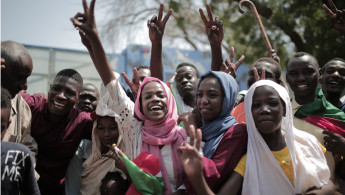Bring justice to victims of Sudan massacre, says Amnesty
Amnesty International described the military attack on Sudanese protesters as 'disproportionate use of violence, unnecessary use of violence and provocative use of violence'.
2 min read
Sudanese revolutionaries ousted Omar al-Bashir in April [AFP]
Rights group Amnesty International on Friday called for justice for those killed during months of protests that rocked Sudan, insisting that demonstrators had faced "disproportionate and unnecessary" violence.
Sudan has experienced unprecedentedly large rallies since December, first against now ousted leader Omar al-Bashir and later against the generals who seized power after overthrowing him.
The protest movement says that more than 250 demonstrators were killed in the violence, including at least 127 in a crackdown on a sit-in during early June outside military headquarters in Khartoum.
Read also: ’I still feel like a prisoner': Sudanese torture survivors neglected by the UK Home Office
"Amnesty International thanks the people of Sudan for showing us courage, for showing us resilience and for showing that we can resist injustice and violation of human rights," Amnesty International Secretary General Kumi Naidoo told reporters during a visit to Khartoum, in the first such trip by the rights group's chief to Sudan.
He said the demonstrators were confronted by "disproportionate use of violence, unnecessary use of violence and provocative use of violence".
"Amnesty International will back the Sudanese people in calling on the new government to ensure that there is absolute accountability and justice" for the families of those killed.
Protests first erupted in December against the then government's decision to triple the price of bread.
They swiftly escalated into a nationwide campaign against Bashir's ironfisted three decade rule.
The army ousted Bashir on April 11 but protesters continued their street campaign, switching it against the military council that overthrow him.
In August, Sudan embarked on a transition to civilian rule thanks to a power-sharing deal signed between protest leaders and the generals, and a joint civilian-military ruling body was sworn in.
On Sunday, an 18-member cabinet was sworn in, the first since the ouster of Bashir.
Agencies contributed to this report.
Sudan has experienced unprecedentedly large rallies since December, first against now ousted leader Omar al-Bashir and later against the generals who seized power after overthrowing him.
The protest movement says that more than 250 demonstrators were killed in the violence, including at least 127 in a crackdown on a sit-in during early June outside military headquarters in Khartoum.
Read also: ’I still feel like a prisoner': Sudanese torture survivors neglected by the UK Home Office
"Amnesty International thanks the people of Sudan for showing us courage, for showing us resilience and for showing that we can resist injustice and violation of human rights," Amnesty International Secretary General Kumi Naidoo told reporters during a visit to Khartoum, in the first such trip by the rights group's chief to Sudan.
He said the demonstrators were confronted by "disproportionate use of violence, unnecessary use of violence and provocative use of violence".
"Amnesty International will back the Sudanese people in calling on the new government to ensure that there is absolute accountability and justice" for the families of those killed.
Protests first erupted in December against the then government's decision to triple the price of bread.
They swiftly escalated into a nationwide campaign against Bashir's ironfisted three decade rule.
The army ousted Bashir on April 11 but protesters continued their street campaign, switching it against the military council that overthrow him.
In August, Sudan embarked on a transition to civilian rule thanks to a power-sharing deal signed between protest leaders and the generals, and a joint civilian-military ruling body was sworn in.
On Sunday, an 18-member cabinet was sworn in, the first since the ouster of Bashir.
Agencies contributed to this report.
Follow us on Twitter: @The_NewArab





 Follow the Middle East's top stories in English at The New Arab on Google News
Follow the Middle East's top stories in English at The New Arab on Google News
![Netanyahu furiously denounced the ICC [Getty]](/sites/default/files/styles/image_330x185/public/2024-11/GettyImages-2169352575.jpg?h=199d8c1f&itok=-vRiruf5)
![Both Hamas and the Palestinian Authority welcomed the ICC arrest warrants [Getty]](/sites/default/files/styles/image_330x185/public/2024-11/GettyImages-2178351173.jpg?h=199d8c1f&itok=TV858iVg)
